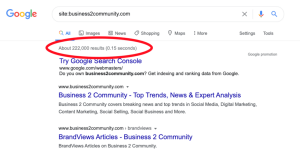— January 8, 2019

FirmBee / Pixabay
Everyone talks about the Google algorithm automatically ranking web pages into search results based on multiple pieces of information. There’s no way humans could search and order billions of results per second to give us what we are looking for. But, Google does use an army of humans to help it review the quality of results.
Search Engine Land says Google employs more than 10,000 Google quality raters around the world, operating in multiple languages. Their job is to rate the quality of pages that appear in search results. Simple, right?
In this post, we explain what that means in practice and how it helps us with search engine optimisation. Google likes SEO, if it is done according to the Google Webmaster Guidelines.
The rules for Google quality raters
The quality raters work to a document called Google Quality Rater Guidelines. You can see the PDF here, should you want to read all 164 pages of it.
If you want to understand how Google thinks, and how to make your website visible in search results to the right people at the right time, you should digest the first couple of pages in the guide. These pages give a succinct insight into how Google’s algorithm is programmed to rank pages.
Here are key things to consider
- The guide says, “Good search engines give results that are helpful for users in their specific language and locale.”
- The job of a quality rater is to represent the user while testing a search and evaluating a page. (In other words, they need to think about relevance between the search term and the page, and whether the page is suitable to the likely intent behind the search.)
- “Ultimately, the goal of page quality rating is to evaluate how well the page achieves its purpose.”
- A quality rater evaluates whether the page achieves its purpose, taking into account the context of the whole website as well as the search term for which the page appears.
Making sure you score well
As a search marketing agency, one of our main priorities is making sure the sites that we manage would score well, should they come in front of a Google quality rater. We’re looking at the on-page and off-page quality signals, which include relevance as well as trust signals. This can be split into on-page trust signals and off-page reputation signals – as we explain in the five pillars of SEO ecosystem.
Understanding the purpose of the page is a good starting point. Google gives these examples of pages where the purpose is simple.
- News website homepage: to inform users of recent events.
- Shopping page: To sell or give information about a product.
- Video page: To share a video.
- Currency converter page: To calculate currency amounts between currencies.
When we are reviewing pages on your website, we’re thinking about the primary purpose of each page. Any website where pages serve multiple purposes can be problematic.
Your money or your life
Google places high importance on what it calls YMYL pages (your money or your life). These are pages that ask for financial, medical or other personal information.
Google says, “We have very high Page Quality rating standards for YMYL pages because low quality YMYL pages could potentially negatively impact users’ happiness, health, financial stability, or safety.”
Expertise, authority, trustworthiness
Google also asks raters to consider a page’s expertise, authority and trustworthiness. This could cover various aspects. For example, a page that purports to be an expert guide on fishing, on a site that has no other pages about fishing, might be considered to be less reliable than a similar article on a specialist fishing website.
A page that asks you for personal information, but does not contain a privacy promise or other trust signals, might be considered to lack trustworthiness.
All of this also relates to the main content on a page. If the page being rated is a product page, the rater will be mainly interested in the title of the product, the price, the description and other pertinent information about the product in question, not the other elements on the page, such as navigational furniture.
Characteristics of high quality pages
Here is the section from the Quality Rater Guidelines for on-page trust signals.
High quality pages exist for almost any beneficial purpose, from giving information to making people laugh to expressing oneself artistically to purchasing products or services online.
What makes a high quality page?
A high quality page should have a beneficial purpose and achieve that purpose well. In addition, high quality pages have the following characteristics:
- High level of Expertise, Authoritativeness, and Trustworthiness (E-A-T).
- A satisfying amount of high quality Main Content (MC), including a descriptive or helpful title.
- Satisfying website information and/or information about who is responsible for the website. If the page is primarily for shopping or includes financial transactions, then it should have satisfying customer service information.
- Positive website reputation for a website that is responsible for the MC on the page. Positive reputation of the creator of the MC, if different from that of the website.
Relevance and intent are important
Page quality is also considered in the context of a search term. Google gives ‘apple’ as an example. Anyone searching just that word might be looking for a computer, a phone, a fruit, a person or a place in the USA.
It advises quality raters to differentiate between the dominant search term and the common search term, with others being minor interpretations.
Because of the authority and ubiquity of the Apple brand, the dominant term would be ‘apple (computer)’, with ‘apple (fruit)’ being the common query.
It also gives the example of time-based context. A search in the 90s for ‘George Bush’ would have most likely been a search for information about the 41st US president, George H W Bush. In the 2000s, it would more likely be a search for George W Bush, the 43rd president.
A quality rater’s job is to see if the pages that appear match the likely dominant search, and that the pages have expertise, authority and trustworthiness.
In short, the rater’s job is to think, “Is this the page I would expect to see for this query, and does it have enough relevance and quality to appear at the top of the results for this query?”
Digital & Social Articles on Business 2 Community
(56)
Report Post





